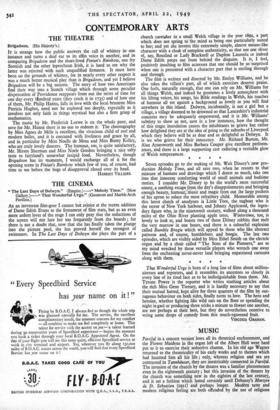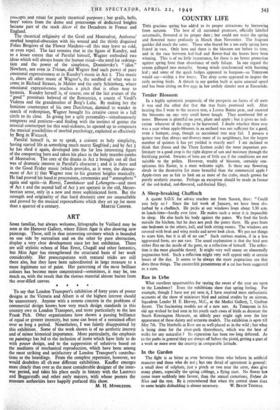MUSIC
Parsifal in a concert version loses all its theatrical enchantment, and the Flower Maidens in the organ loft of the Albert Hall were hard put to it .to exercise their seductive charms. In his old age Wagner returned to the theatricality of his early works and to themes which had haunted him all his life ; only, whereas religion and sex are contrasted in Ttatnhauser, they are inextricably connected in Parsifal. The invasion of the church by the theatre was a familiar phenomenon even in the eighteenth century ; but this invasion of the theatre by the church was something new in the eighties of the last century, and it set a fashion which lasted certainly until Debussy's Martyre de St. Sebastien (1911) and perhaps longer. Modern taste and modern religious feeling are both offended by the use of religious cont..cpts and ritual for purely theatrical purposes ; but grails, bells, boys' voices from the dome and processions of dedicated knights became part of the stock decor of the Decadents in France and England. _ The theatrical religiosity of the Grail and Montsalvat, Amfortas' morbid hospital-obsession with his wound and the thinly disguised Folies I3ergeres of the Flower Maidens—all this may leave us cold, or even repel. The fact remains that in the figure of Kundry, and to a lesser extent that of Parsifal himself, Wagner embodied two ideas which will always haunt the human mind—the need for redemp- tion and the power of the simpleton, Dostoievsky's " idiot." Nowhere, not even in Tristan, did Wagner find-such power of pure emotional expressiveness as in Kundry's music in Act 2. This music is, above all other music of Wagner's, the seedbed of what was to come in Richard Strauss, in Mahler and the early Schonberg, where emotional expressiveness reaches a pitch that is often near to hysteria. Kundry herself is, of course, one of the laSt avatars of the " good " prostitute beloved of the Romantics, a cousin of Verdi's Violetta and the grandmother of Berg's Lulu. By making her the feminine counterpart of his own Dutchman, damned to wander in search of redemption, Wagner brought his creative career in a full circle to its close. In giving her a split personality—simultaneously temptress and penitent—and finding with the instinct of genius the musical counterpart for .this soul-sickness, he opened up to composers the musical possibilities of morbid psychology, exploited so effectively by Berg in Wozzeck.
Parsifal himself is, so to speak, a convert to holy simplicity, having started life as something much nearer Siegfried ; and by Act 3 he has shed it again, developed into the far less interesting figure of the conquering hero and taken his place in the holy mumbo-jumbo of Monisalvat. The core of the drama in Act 2 brought out all that was of dramatic interest in Parsifal's character ; and it is there and in the Good Friday music (which provides, as it were, the denoue- ment of Act"2) that Wagner rose to his greatest heights musically. He had proved his hand at processions, ceremonies and " atmosphere " again and again—in Rienzi, Tannhiiuser Lohengrin--and most of Act r and the second half of Act 3 are operatic in the old, Meyer- beerian sense, only in a new and more sophisticated form. But the strength and originality of that hard dramatic core are unassailable and proved by the musical repercussions which they set up for more



































 Previous page
Previous page